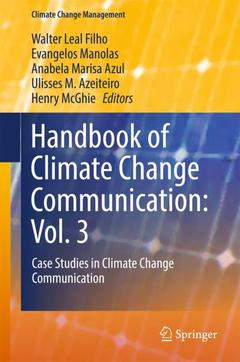Description
Handbook of Climate Change Communication: Vol. 3, Softcover reprint of the original 1st ed. 2018
Case Studies in Climate Change Communication
Climate Change Management Series
Coordinators: Leal Filho Walter, Manolas Evangelos, Azul Anabela Marisa, Azeiteiro Ulisses M., McGhie Henry
Language: English
Subjects for Handbook of Climate Change Communication: Vol. 3:
Publication date: 01-2018
Support: Print on demand
Publication date: 06-2019
398 p. · 15.5x23.5 cm · Paperback
Description
/li>Contents
/li>Biography
/li>Comment
/li>
This comprehensive handbook provides a unique overview of the theory, methodologies and best practices in climate change communication from around the world. It fosters the exchange of information, ideas and experience gained in the execution of successful projects and initiatives, and discusses novel methodological approaches aimed at promoting a better understanding of climate change adaptation. Addressing a gap in the literature on climate change communication and pursuing an integrated approach, the handbook documents and disseminates the wealth of experience currently available in this field.
Volume 3 of the handbook provides case studies from around the world, documenting and disseminating the wealth of experiences available.
Describes research and innovation on climate change communication in a comprehensive way
Presents cases and material from over 40 countries
Provides government and non-government bodies with a sound basis to promote climate change adaptation efforts
The most comprehensive publication on the topic so far




